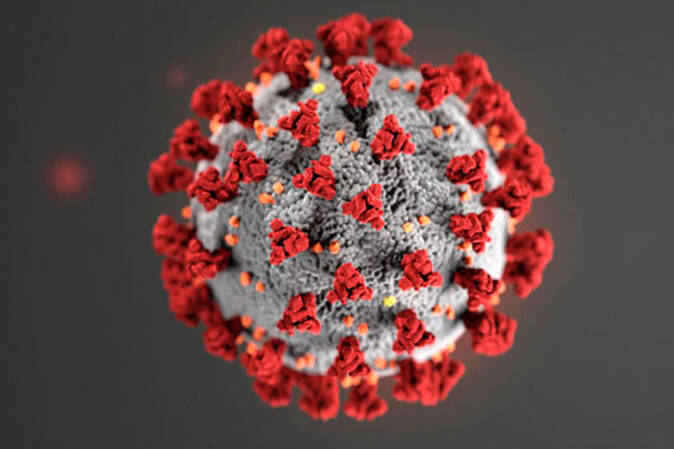Health officials said during a public science session Wednesday that the current state of COVID-19 really varies around the world, but that new cases, hospitalizations and deaths are plateauing in Alaska.
Dr. Anne Zink, the chief medical officer of the state, said Wednesday that varying vaccination rates and mitigation policies are affecting outbreaks in other parts of the world.
“(There are) lots of different things going on, as we have different people with different immunization rates, different countries have seen different rates of COVID,” Zink said. “We see really different cases overall.”
She said that while cases are plateauing and coming down in the U.S. and Canada, some places in Europe and Asia are starting to see another uptick.
“Unfortunately, right now Hong Kong and South Korea are just seeing really high case rates, as well as hospitalizations and deaths,” Zink said.
She said the common denominator to reducing cases, hospitalizations and deaths continues to be COVID vaccines.
“Again, vaccination, particularly for the elderly, (is) making a gigantic difference in minimizing the hospitalizations and deaths in countries that are well immunized, but we continue to see cases particularly as omicron spreads,” Zink said.
According to state data Wednesday, both hospitalizations and new cases in Alaska were down. From the week of March 2 to this week, new infections decreased by 35%.
All new sequenced cases in Alaska are caused by the highly contagious omicron variant of the virus, and by its subvariant B.A.2.
“We’re seeing an increase of kind of this other version of the omicron variant, this B.2,” Zink said Wednesday. “It’s slightly more transmissible, so (we’re) seeing it move and kind of outcompete that B.1.”
She cited data showing that COVID vaccines are still working well to minimize the risk of hospitalization.
As of Wednesday, slightly over 64% of Alaskans 5 years and older had completed their primary vaccine series.
Of those, approximately 32% were up to date on their whole series, including extra doses and boosters. Almost 27% of folks were overdue for a booster dose as of Wednesday, and about 5% were not yet due for a booster.
The Kenai Peninsula Borough is still the second-least vaccinated region in the state. As of Wednesday, 49.1% of peninsula residents 5 and older were fully vaccinated against COVID.
Officials widely agree getting vaccinated against COVID will help slow the spread even further and protect people from severe illness, hospitalization and death.
The Pfizer-BioNTech vaccine is approved for everyone 5 years and older, while the Moderna and Johnson & Johnson/Janssen vaccines are approved for anyone 18 and older.
In addition to a primary series — two doses of the Pfizer or Moderna vaccine or one dose of the Janssen vaccine — experts are strongly encouraging booster shots to protect against omicron, whether or not a person has already contracted the virus and despite elapsed time since the completion of the primary series. The Food and Drug Administration and Centers for Disease Control and Prevention are recommending Pfizer boosters for anyone 12 and older at least five months after the primary series. Additionally, Moderna boosters are recommended for anyone 18 and older at least six months after a primary series.
Janssen boosters are approved for anyone 18 and older at least two months after initial vaccination, although DHSS officials say the Janssen shot isn’t the preferred vaccine because of risks of blood clotting and less robust protection against COVID. The state recommends people with a primary Janssen vaccine to get either a Pfizer or Moderna booster.
Getting a vaccine
COVID-19 vaccines do not cost money, and are available to people with and without health insurance. Many organizations on the central peninsula — including Walmart, Walgreens, the Kenai Fire Department and Kenai Public Health — offer vaccines.
Additionally, Soldotna Professional Pharmacy hosts a walk-in clinic in its strip mall storefront at the “Y” intersection of the Sterling and Kenai Spur highways. The clinic is open from noon to 6 p.m. Monday through Friday and 10 a.m. to 2 p.m. on Saturday.
Vaccination appointments can also be scheduled through the online portal PrepMod, which can be accessed at myhealth.alaska.gov.
A map of vaccine providers can be found on DHSS’ COVID-19 vaccine website at covidvax.alaska.gov.
People who would like assistance scheduling a vaccination appointment can call the Kenai Peninsula Borough Office of Emergency Management call center. The center operates Monday through Friday from 9 a.m. to noon. The central peninsula call center can be reached at 907-262-4636. The Homer call center can be reached at 907-235-4636. The Seward call center can be reached at 907-224-4636.
Testing locations
Officials encourage anyone with symptoms to test for COVID-19, despite vaccination status.
In Kenai, testing is available at Odyssey Family Practice, Kenai Public Health Center and Capstone Clinic. At-home test kits are also available for free at Kenai Public Health.
In Soldotna, testing is available at the Peninsula Community Health Center, Urgent Care of Soldotna, Walgreens and Soldotna Professional Pharmacy.
In Homer, testing is available at South Peninsula Hospital, or through other area health care providers at Seldovia Village Tribe Health and Wellness, Kachemak Medical Group and Homer Medical Center. In Seward, testing is available at Providence Medical Center, Glacier Family Medicine, Seward Community Health Center and the Safeway pharmacy.
Reach reporter Camille Botello at camille.botello@peninsulaclarion.com.

